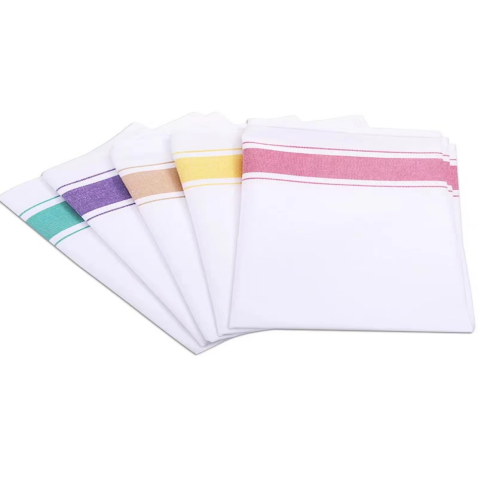Language
Currency


Introduction:
In the realm of custom tea towels, material and fabric selection serve as the cornerstones of quality and functionality. These humble yet essential kitchen accessories not only assist in daily chores but also add a touch of personality and style to any kitchen space. Delving deeper into the myriad options of fabrics, such as cotton, linen, and blends, allows for a comprehensive understanding of how each material can significantly impact the final product's appearance and performance.
Cotton:
Renowned for its softness, absorbency, and durability, cotton stands as a perennial favorite in the world of tea towels. Its versatility allows for a range of customization options, from traditional weaves to smoother sateen finishes. Cotton tea towels offer not only practicality in everyday use but also serve as a blank canvas for intricate designs and vibrant prints, making them a staple in households and businesses alike.
Linen:
Steeped in history and revered for its luxurious texture, linen exudes an air of sophistication unlike any other fabric. While linen may not match cotton's absorbency, its durability and natural luster make it a coveted choice for tea towels. With each wash, linen softens and gains character, elevating any kitchen with its timeless elegance and understated charm.
Blends:
Blended fabrics, such as cotton-linen blends, amalgamate the best attributes of each material to offer a harmonious blend of softness and resilience. These versatile fabrics strike a delicate balance between absorbency and durability, making them ideal for a variety of uses. Blended tea towels provide the best of both worlds, catering to the needs of modern households while maintaining a touch of classic refinement.

Appearance:
The choice of fabric significantly influences the aesthetic appeal of tea towels. Cotton's matte finish lends itself well to vibrant prints and bold designs, while linen's natural sheen adds an element of sophistication to any artwork. Blended fabrics offer a unique blend of textures, allowing for endless possibilities in customization. Design considerations should be tailored to the fabric's characteristics to ensure a visually stunning final product.
Performance:
Beyond appearance, fabric type plays a crucial role in the performance of tea towels. Cotton excels in absorbency, making it ideal for tasks such as drying dishes and hands. Linen, with its quick-drying properties and resistance to mildew, offers practicality in humid environments. Blended fabrics combine the strengths of both materials, providing a versatile solution for various household needs.
Factors to consider:
Selecting the appropriate fabric for custom tea towels involves considering several factors, including intended use, budget constraints, and environmental considerations. By assessing these factors, one can make an informed decision that aligns with their preferences and values.
Tips for Making Informed Decisions:
Researching fabric options, seeking advice from suppliers or manufacturers, and soliciting feedback from previous customers are invaluable steps in the decision-making process. Armed with knowledge and insights, individuals can confidently select the fabric that best suits their needs and preferences.
Conclusion:
Material and fabric choices serve as the bedrock of quality and functionality in custom tea towels. Whether opting for the plush softness of cotton, the timeless elegance of linen, or the versatility of blended fabrics, selecting the right material is paramount to achieving the desired outcome. By understanding the unique characteristics of each fabric type and considering various factors, individuals can create tea towels that not only meet their practical needs but also reflect their personal style and values. In the tapestry of kitchen essentials, custom tea towels stand as a testament to the beauty and versatility of fabric craftsmanship.
Lỗi định dạng email
emailCannotEmpty
emailDoesExist
pwdLetterLimtTip
inconsistentPwd
pwdLetterLimtTip
inconsistentPwd